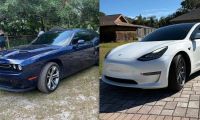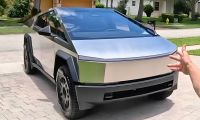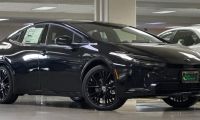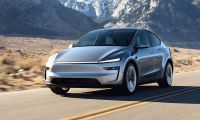Most have seen the news reports regarding what the federal government predicts for automotive's fuel future. The U.S. Energy Information Administration (EIA) released their Annual Energy Outlook report for 2014, which predicts that by 2040, nearly 80 percent of cars will still run on gasoline. The other twenty percent will be split between diesels and hybrids with just two percent being plug-ins and only half of those (1%) being full electrics.
“The numbers of LDVs [light duty vehicles] powered by fuels other than gasoline, such as diesel, electricity, or E85, or equipped with hybrid drive trains, such as plug-in hybrid or gasoline hybrid electric, increase modestly from 18 percent of new sales in 2012 to 22 percent in 2040."
The Nissan LEAF is currently the world's best-selling battery electric vehicle (BEV) and it appears it will remain so for the foreseeable future as no other automaker with a BEV has sales figures to rival it nor do they have production capacity to beat Nissan's volume. Will the LEAF be the best seller in 2040? I doubt anyone can accurately predict that. In 2020? I think we can safely say "affirmative" there. What will the electric car world look like in 2040, though? With or without the LEAF?
Current vehicle sales volumes are at about 14.5 million in the U.S. annually. Sales volumes have risen, in recent history, at a rate roughly commensurate with the population's growth. Roughly one car is sold for every 20 people by recent numbers, though those odds have changed slightly and are slowly moving toward a trend of fewer car sales per person. This data can be figured using the U.S. Census Bureau figures versus vehicle sales data from 2000 to present.
U.S. population projections out to 2040 suggest that U.S. population will be about 380 million people in 2040 (U.S. Census projections, 2012). If the rate of vehicle buying remains about the same, then 14.5 million sales will increase to 19-20 million sales by that same time. Given that the same census projections show an older population, it's very likely sales will actually be higher.
One percent of those 20 million sales will be battery EVs, so about 200,000 annually. Before you say that this isn't enough, remember that in 2040, fuel choices will be broad - hydrogen fuel cells are being introduced now and will be on the market from most major automakers before 2020, biodiesel will likely have become standardized and accepted in our near future, and gasoline engines (and renewable gasoline options) will likely continue to become more efficient. With 100 years of petroleum fuel and engine development, it will take a long time to pull the eggs out of that petroleum paradigm basket. 2040 is only twenty-five years away. And remember, we're talking annual sales, not total vehicles on the road.
Now, let's crunch numbers for the LEAF. Predicting future numbers is not easy, but let's assume the LEAF's sales volumes increase by ten percent per year for the next five years. Unlikely? Not really, given the growth it's already seen and the fast growth of competitors like Tesla. We can also assume that in that time span, the LEAF is likely to be the only mass volume, sub-$30k battery electric car on the market for that time frame, I think assuming a ten percent growth is somewhat optimistic, but not overly so.
Final sales figures for 2013 aren't in yet, but they're projected to be about or just above 22,000 in the U.S. alone. A ten percent increase for five years would mean pushing that number up to about 35,500 per year in 2020. By then, we can assume the BEV and overall EV market will be getting much more competitive than it is now. Still, 35.5k cars is nothing to complain about and most manufacturers would love to have that kind of sales growth for an established model.
We can also assume that by 2020, Nissan itself will have more electric vehicles on offer in its lineup. Likely beginning, I would predict, in the premium (luxury) and commercial markets - perhaps with an Infiniti Q50/60 EV and an NV200 EV.
Going beyond 2020 is tricky and probably not very realistic given the limited data we have. At least, not for a specific model like the LEAF. If Nissan continues to keep the LEAF relevant, however, it's not out of the question that it would remain the top-selling BEV in the U.S. even twenty-five years from now. The Toyota Prius, after all, has been on the U.S. market for fifteen years and is by far the best-selling hybrid available to this day, despite a lot of new competition in recent years.
At the same time, for grins and giggles, it's also not out of the question that in 2040, a 2012 Nissan LEAF would be a collector's car. Why not?











